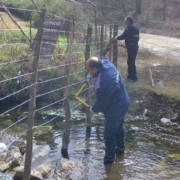When in doubt, nature
After a long judicial process, a group of residents of the town of Gualeguaychu (Entre Ríos) managed to get the Supreme Court of Justice to rule in favor of their claim in an important precedent that recognized and applied novel principles of environmental law.
“Below, we offer a google translate version of the original article in Spanish. This translation may not be accurate but serves as a general presentation of the article. For more accurate information, please switch to the Spanish version of the website. In addition, feel free to directly contact in English the person mentioned at the bottom of this article with regards to this topic”.
Such course of action began with an action for environmental protection filed by a group of Gualeguaychu residents against a real estate project located near the river of the same name, demanding the cessation of works and the environmental recomposition. In the first instance, the action was accepted, although afterwards the Superior Court of Justice Entre Ríos (hereinafter STJER) annulled the judgment. Before this last pronouncement, the amparistas presented an extraordinary federal appeal, which, although it was rejected by the STJER, was admitted by the Supreme Court of Justice (hereinafter “The Court”), revoking in its resolution that resolved by the high provincial court.
Although the highest court in Argentina only overturned the ruling of his interlocutor paring the proceedings to the court of origin, the considerations for arriving at such a decision reaffirmed certain existing rules and principles in environmental law (procedural and substantial), at the same time that crystallized novel legal principles in the matter. In effect, the Court once again stressed the integral systemic nature of the watersheds and the importance of the protection of the wetlands (affected in this case) as integral and interdependent parts of the water system, citing as a normative instrument the Ramsar Convention (Relative Convention to Wetlands of International Importance, especially as Waterfowl Habitat).
Likewise, the Court assessed the application of the precautionary principle, and also introduced the novel application of the principles in dubio pro natura and in dubio pro aqua.
Regarding the principle in dubio pro natura, this establishes (in the words of the Court) that: “In case of doubt, all proceedings before courts, administrative bodies and other decision-makers must be resolved in such a way as to favor protection and conservation. of the environment, giving preference to less harmful alternatives. Actions will not be taken when their potential adverse effects are disproportionate or excessive in relation to the benefits derived from them.”
Regarding the principle in dubio pro aqua, he argued that: “In case of uncertainty, environmental and water disputes should be resolved in the courts, and application laws interpreted in the most favorable way to the protection and preservation of the resources of water and related ecosystems.”
In short, the Court revoked the decision of the STJER since it directly affected access to environmental justice (Article 32 of Law 25.675) and the principles in dubio pro natura and pro aqua, in the defined terms. Undoubtedly, the jurisprudential recognition of the highest judicial body means the incorporation of both guidelines to Argentine environmental law. They are welcome.
More information
Author
Juan Bautista Lopez, juanbautistalopez@fundeps.org








